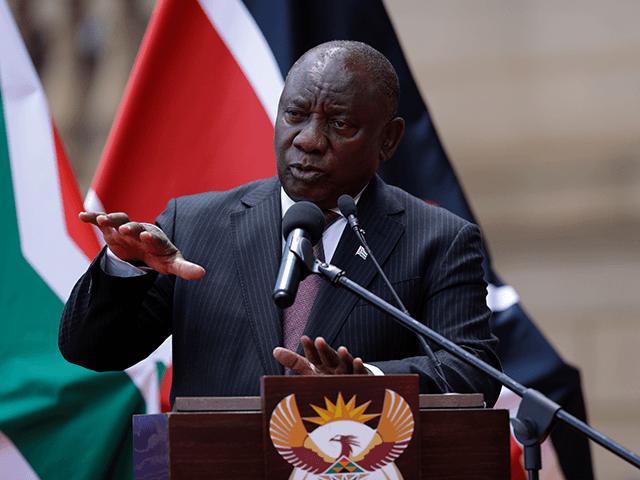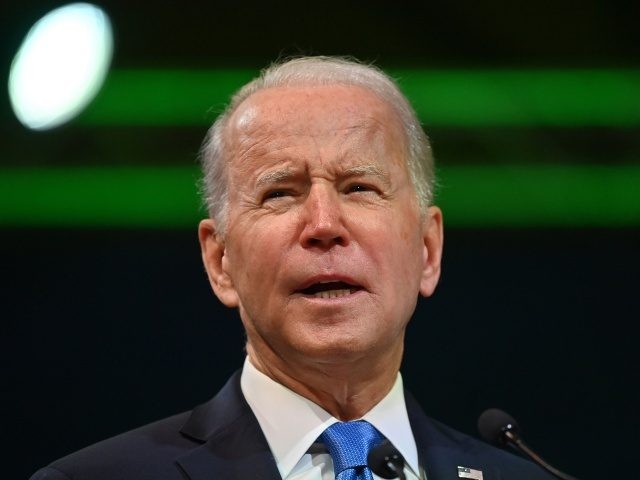The presidents of Nigeria and Cote d’Ivoire joined South African President Cyril Ramaphosa for engagements on Wednesday and Thursday in solidarity following the imposition of a travel ban on that country by President Joe Biden and leaders of European and Middle Eastern states this week.
Several countries issued the travel bans in response to the discovery of a new Chinese coronavirus variant, dubbed “Omicron,” which South African scientists first identified. No evidence suggests the variant originated in South Africa, however, and multiple European countries have revealed since the announcement of Omicron’s discovery that they have documented cases of the variant on their soil prior to the first South African case last week.
European travel bans have taken much longer to arrive than the swift ban on African travelers.
Last year, in response to President Donald Trump implementing similar restrictions on travel from China and elsewhere at the beginning of the pandemic, Biden referred to these policies as deriving from “hysteria, xenophobia, and fear-mongering.”
Ramaphosa has similarly condemned the bans since the World Health Organization (W.H.O.) declared Omicron a “variant of concern” last week. The South African leader has used an ongoing west African tour to engage fellow heads of state, who have given Ramaphosa a platform to condemn the travel bans. By welcoming Ramaphosa and his entourage, the presidents — so far, Muhammadu Buhari of Nigeria and Alassane Ouattara of Cote d’Ivoire — are also sending a direct message of welcome to South African citizens at a time in which much of the world has closed its doors to them.
In remarks following talks with Ouattara on Thursday, Ramaphosa called the travel bans a “slap in the face of African excellence and expertise,” noting that South African doctors first identified the variant – making it possible for the rest of the world to test for it in their coronavirus patients.
“The imposition of travel bans on South Africa and a number of countries in the southern African region are regrettable, unfair and unscientific,” Ramaphosa asserted.

U.S. President Joe Biden delivers remarks on the Omicron COVID-19 variant following a meeting with his COVID-19 response team, including U.S. Vice President Kamala Harris (L) and Anthony Fauci (R), Director of the National Institute of Allergy and Infectious Diseases and Chief Medical Advisor to the President, at the White House on November 29, 2021, in Washington, DC. (Anna Moneymaker/Getty Images)
The South African president made similar comments on the “extremely harsh and unfair travel restrictions” on Wednesday in Nigeria, expanding more on his opposition to the bans during a press conference alongside Buhari.
“President Buhari, the solidarity expressed by yourself and the government of Nigeria sends the strongest of messages,” Ramaphosa said. “It says that as African countries we are standing united against the imposition of arbitrary and discriminatory restrictions that are not only unscientific, but counter-productive in the long run.”
Ramaphosa also thanked leaders of Ghana and Senegal for expressing opposition to the bans.
“The resulting damage from this ban to national economies on the continent will be considerable and long-lasting,” Ramaphosa warned.
Buhari did not specifically address the travel bans but noted that Ramaphosa’s visit to Nigeria had been successful despite pandemic fears — an endorsement of letting South Africans into the country.
”I sincerely wish to thank my brother and colleague, President Cyril Ramaphosa for honouring my invitation. I equally wish to thank members of the South African delegation and the experts that worked tirelessly during the Senior Officials Meeting,” Buhari said, referring to the meeting as a success.
Nigeria was among the nations to document Omicron cases in samples taken from patients before the first confirmed case in South Africa. The first sample to test positive in Nigeria was taken in October — the earliest known case of Omicron at press time. The Netherlands, Belgium, and Botswana also reportedly documented cases of Omicron. Botswana was the first country to go public with Omicron cases, which helped South Africa identify the variant, but public officials there claim their first Omicron patients were foreign diplomats. The officials have refused to name the origin countries of the diplomats out of an alleged fear of “geo-politicizing” the virus.

South African President Cyril Ramaphosa addresses the media after meeting with his Kenyan counterpart Uhuru Kenyatta in Pretoria, South Africa, Tuesday, Nov. 23, 2021 . Kenyatta is in South Africa on a state visit to discuss political and economic issues. (AP Photo/Themba Hadebe)
Pressure has mounted on Biden and other world leaders to remove the travel restrictions on African countries out of concerns that they are discriminatory and will do little to combat the spread of the virus. United Nations Secretary-General António Guterres has repeatedly condemned the bans, referring to them on Wednesday as “travel apartheid.”
“This is a very strong appeal that I launch, an appeal to common sense. We have the instruments to have safe travel. Let’s use those instruments to avoid this kind of, allow me to say – travel apartheid – which I think is unacceptable,” he said.
The head of the World Health Organization (W.H.O.), Tedros Adhanom Ghebreyesus, also warned against the Biden bans, calling them “blunt” and lamenting that South Africa and Bostwana were “being penalized by others for doing the right thing” by reporting the existence of Omicron.
Scientists and doctors have warned that, given the novelty of Omicron, it is not yet clear how it compares to the current dominant Chinese coronavirus variant, “Delta” from India, in terms of transmissibility and severity of symptoms. South African doctors who have treated Omicron patients have documented extreme fatigue but otherwise “mild” respiratory disease symptoms.

COMMENTS
Please let us know if you're having issues with commenting.